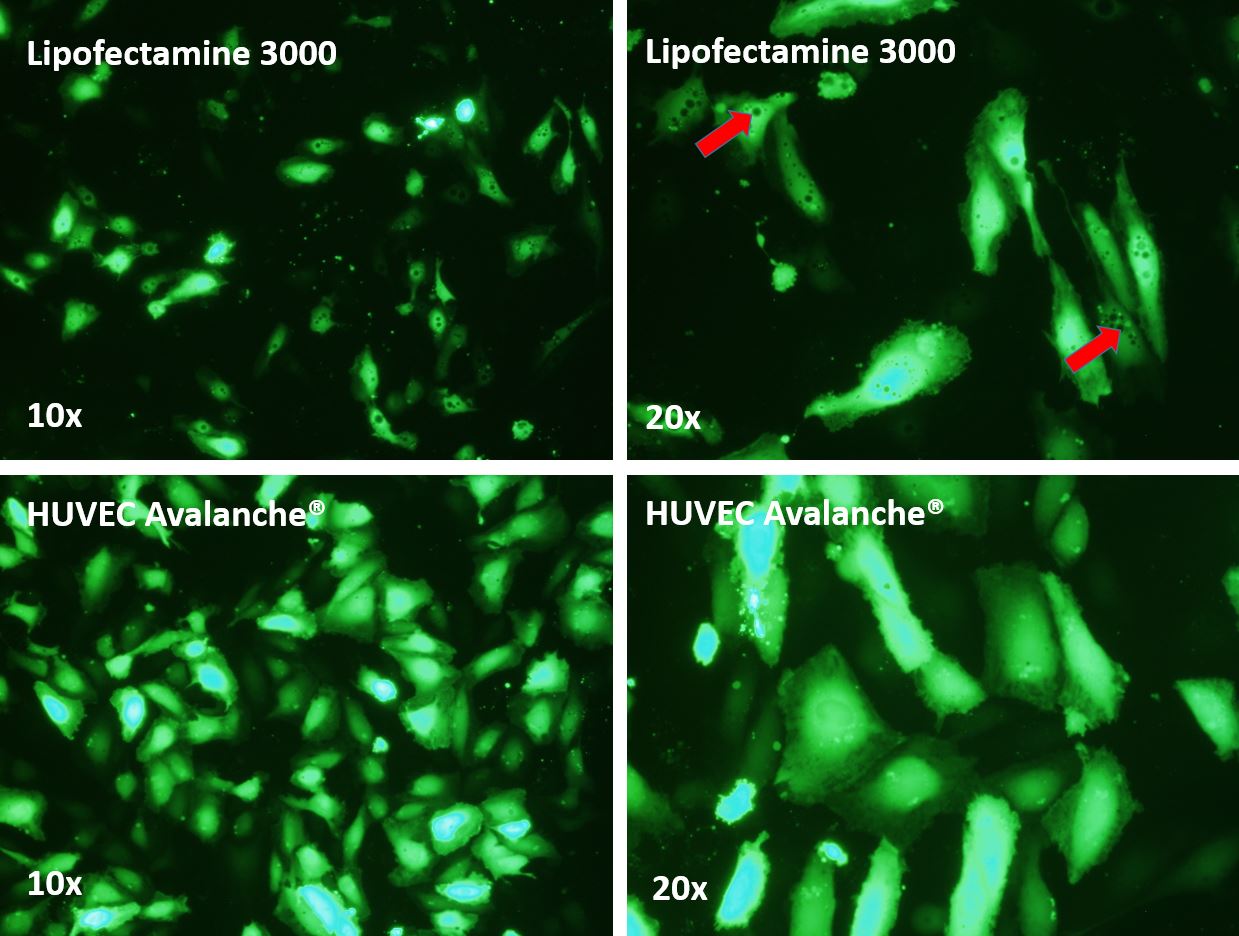Description
Cells to transfect:
Cell Name: Human Umbilical Vein Endothelial Cell (HUVEC)
Cell Synonyms: HUVEC, Umbilical Vein Endothelial Cells
Human Umbilical Vein Endothelial Cells (HUVEC) are isolated from normal human umbilical vein. HUVEC are responsive to cytokine stimulation in the expression of cell adhesion molecules. These cell systems are commonly used for physiological and pharmacological investigations, such as macromolecule transport, blood coagulation, and fibrinolysis. HUVEC can be used in the following applications:
Cardiovascular pharmaceutical development
Vascular pathology
Atherosclerosis
Angiogenesis
Inflammation
Wound healing
Oncology
The Transfection Reagent Features:
- Broad spectrum for the transfection of large plasmid, mRNA, siRNA, and/or other type of nucleic acids, which is best for co-transfection of different type and/or size of nucleic acids.
- Specifically optimized to deliver nucleic acids into HUVEC
- Highest efficiency to ensure experimental success
- Extremely gentle to cells
- Much less reagent needed for each transfection: 0.5 ml is able to transfect about 1000 wells of 24-well plate
- synthesized from 100% animal origin-free components, making it easy to validate the absence of zoonotic diseases, such as BSE or viruses, in research experiments or cells lines
- Compatible with serum
- Suitable for Reverse Transfection
- Reproducible: due to highly controlled chemical synthesis of each of the ingredients, the reagent forms uniformly sized complex particles with nucleic acids. With optimized protocol, our reagent will ensure the reproducible highest transfection results.
- Developed and manufactured by EZ Biosystems
Data
 FIG. 1. (Click image to enlarge) High throughput test of transfection efficiency (determined as RLU/mg) on human umbilical vein endothelial cells (HUVEC) after transfection of luciferase reporter gene by using our 172 proprietary transfection formulas and several most popular commercial transfection reagents. The yellow box showed the results of 4 commercial transfection reagents. The red lines marked our candidate formulas with the highest transfection efficiency for HUVEC. This test result was confirmed with repeat experiments. The one that showed the optimal balance of potent & low cytotoxicity among those candidate formulas after flow cytometry analysis on the percentage of 7AAD positive cells was later named as this Human Umbilical Vein Endothelial Cell (HUVEC) Avalanche Transfection Reagent.
FIG. 1. (Click image to enlarge) High throughput test of transfection efficiency (determined as RLU/mg) on human umbilical vein endothelial cells (HUVEC) after transfection of luciferase reporter gene by using our 172 proprietary transfection formulas and several most popular commercial transfection reagents. The yellow box showed the results of 4 commercial transfection reagents. The red lines marked our candidate formulas with the highest transfection efficiency for HUVEC. This test result was confirmed with repeat experiments. The one that showed the optimal balance of potent & low cytotoxicity among those candidate formulas after flow cytometry analysis on the percentage of 7AAD positive cells was later named as this Human Umbilical Vein Endothelial Cell (HUVEC) Avalanche Transfection Reagent.
 FIG. 2. (Click image to enlarge) HUVEC were transfected with GFP vector (pEGFP-N3) by using Lipofectamine® 3000 and HUVEC Avalanche® Transfection Reagent resptctively. The cells were visualized by Nikon Eclipse Fluorescence microscope 48 hours post transfection. In addition to higher transfection efficiency (% GFP+ cells) and higher expression level (brighter) as compared to those of Lipofectamine® 3000, HUVEC Avalanche® Transfection Reagent also shows the least toxicity to the cells. From this figure, HUVEC Avalanche® transfected cells look more healthy (variety of shapes, contact with each other), whereas Lipofectamine® 3000 transfected cells show some signs of stress (smaller, separate from each other, and with vacuoles or bubbles in the cytoplasm). Lipofectamine® is a trademark of Life Technologies Corporation. Avalanche® is a trademark of EZ Biosystems LLC
FIG. 2. (Click image to enlarge) HUVEC were transfected with GFP vector (pEGFP-N3) by using Lipofectamine® 3000 and HUVEC Avalanche® Transfection Reagent resptctively. The cells were visualized by Nikon Eclipse Fluorescence microscope 48 hours post transfection. In addition to higher transfection efficiency (% GFP+ cells) and higher expression level (brighter) as compared to those of Lipofectamine® 3000, HUVEC Avalanche® Transfection Reagent also shows the least toxicity to the cells. From this figure, HUVEC Avalanche® transfected cells look more healthy (variety of shapes, contact with each other), whereas Lipofectamine® 3000 transfected cells show some signs of stress (smaller, separate from each other, and with vacuoles or bubbles in the cytoplasm). Lipofectamine® is a trademark of Life Technologies Corporation. Avalanche® is a trademark of EZ Biosystems LLC
For Other Cells
Human Umbilical Vein Endothelial Cell (HUVEC) Avalanche® Transfection Reagent can also be used on the following cells with high transfection efficiencies.
Human Umbilical Artery Endothelial Cell (HUAEC)
Human Dermal Microvascular Endothelial Cell (HMVEC)
Human Dermal Lymphatic Microvascular Endothelial Cell (HDLMVEC)
Human Artery Endothelial Cell
Human Lung Microvascular Endothelial Cell (HLMVEC, HMVEC-L)
786-O Cell
Caki-1 Cell
MDCK Cell
Vero Cell
293 Cell
293T/17 Cell
Recommended protocols for these cells will be provided with the reagent. The protocols usually provide satisfactory transfection efficiency with invisible cytotoxicity. However, optimization may be needed for certain type of cells. Optimizations may include: the amount of DNA and this transfection reagent; cell density; transfection reagent/DNA ratio, or incubation time for the mixture of transfection reagent/DNA etc. For best transfection result, we recommend using the respective cell type/cell line specific Avalanche transfection reagents. Those reagents have been optimized on both recipes and protocols, and have been proved to have the best transfection results for the respective cell lines or primary cells. You can easily find the respective Avalanche transfection reagents specific for your cells by using the filters of our product list.
Additional Information
| Weight | 0.5 lbs |
|---|---|
| Adherence Phenotype |
Adherent |
| Cell Type |
Endothelial Cell |
| Disease |
Healthy |
| Names starting from |
H |
| Primary/Cell Line |
Primary Cell |
| Product Sizes |
0.5 ml, 1.5 ml |
| Species |
Human |
| Tissue Sources |
Umbilicus |
| Subcategories |
Cell Type/Cell Line Specific |
Documents
Protocols
MSDS
Citations or Feedback


